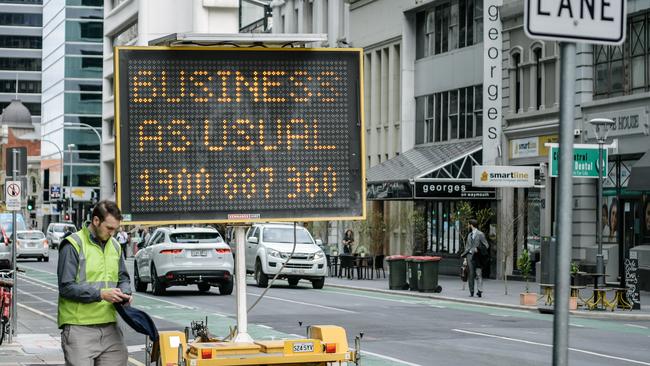Loans, grants and fee waivers can help businesses survive roadworks, small business commissioner says
The Small Business Commissioner has released a commonsense guide to helping businesses cope with roadworks. But he is still pushing for compensation.

SA Business
Don't miss out on the headlines from SA Business. Followed categories will be added to My News.
- Call for compensation for small businesses
- How to get the most out of your Advertiser digital subscription
Governments should consider providing low interest loans, matched spending on advertising and the waiving of fees and charges to help small businesses survive disruptive roadworks, the Small Business Commissioner John Chapman says.
Mr Chapman today released guidelines for state and local governments, and businesses themselves, on how to ensure businesses are not ruined by disruptive roadworks.
Roadworks have been a controversial issue in recent years, with the Torrens to Torrens South Rd upgrade blamed in part for the demise of the Red Door Bakery business at Croydon, with businesses complaining of a double whammy from council roadworks at the same time.

The Advertiser reported on the weekend that traders on King William Rd won’t see roadworks there finish until January, although workers will down tools for Christmas trading.
That project has been going since May and has been blamed for the closure of some businesses such as the Goodwood outlet of Dulwich Bakery and Flowers 152.
Mr Chapman will continue to push for compensation for businesses affected by roadworks, which the State Government has ruled out, but said by using the commonsense measures outlined in the Open to Business - Making Roadworks Work document the damage could be minimised.

“In my role, the issue of roadworks affecting small businesses has been one of the most difficult to deal with as governments seem to think it is okay to rip up and close roads with little consideration of the impact on small businesses,’’ Mr Chapman said.
“Through the intervention of my office, there has been some improvement in the ways government and councils have undertaken these projects in the past two years, but there is still a long way to go before the small businesses will feel confident that their livelihoods are not going to be destroyed by poorly planned and managed projects.’’

The document is a guide but also includes practical checklists for how governments and businesses can manage the process.
Mr Chapman said governments should engage with businesses early in the process, well before roadworks begin, to work together to see how disruption can be minimised.
Specific suggestions for governments include:
Matched advertising: creating an advertising fund to promote the area to potential customers
Grants: these could be used to subsidise discounts, advertising or capital improvements
Waiving fees and charges: land tax, rates and other charges could be waived during the construction period, and
Loan Programs: providing low interest loans to help with cash flow
Mr Chapman said the guidelines could help mitigate the damage caused, but the fact remained that there was a need for “properly assessed and structured compensation” where businesses suffered as a result of works.
Transport and Infrastructure Minister Stephan Knoll has previously said the government would not consider compensation, saying it had instead developed and implemented a small business engagement policy to assist businesses affected by large infrastructure projects.
PROBLEMATIC PROJECTS
— The closure of South Road due to the structural failure of the tram/cycle overpass
— The replacement of the Jetty Road Glenelg tram tracks
— The Bank Street rejuvenation
— Work on South and Port Roads as part of the Torrens-to-Torrens project
— The O-Bahn tunnel affecting Hackney Road


